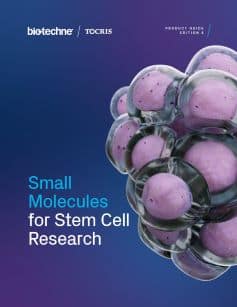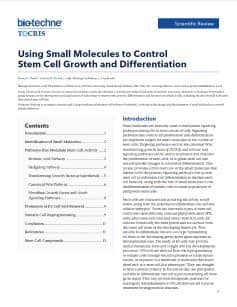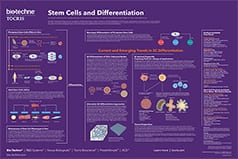GMP & Ancillary Material Grade Small Molecules
Cell and gene therapies are new treatment modalities that are rapidly advancing from the lab into the clinic. With the clinical phases of development being highly regulated, there is a need for superior grade ancillary reagents (also known as raw materials) in the manufacture of cell therapies to ensure the safety and suitability of the final product. At Tocris we are known for our commitment to quality, and now we are supporting the development of new cell therapies with our range of enhanced quality ancillary reagents. Manufactured in our ISO 9001:2015 certified facilities using strictly controlled processes, and with rigorous quality management systems, our GMP and Ancillary Material Grade compounds are intended for use in the manufacture of cell and gene therapies.
Find out more about Bio-techne's GMP Capabilities and how we can support your Cell and Gene Therapy development program by visiting bio-techne.com.
What are Ancillary Materials or Raw Materials?
Ancillary Materials are essential components required for the manufacture of cell and gene therapies or tissue-engineered therapies, but they are not intended to be part of the final product. This includes reagents such as small molecules and proteins as well as cell culture media. Although ancillary materials are not meant to be found in the final product, they can impact the safety, purity and thus suitability of the final cell product for clinical use.
Small Molecules as Ancillary Materials
Small molecules offer several advantages when compared to other ancillary materials for cell therapy manufacture:
- Small molecules are synthetically produced, so can offer high purity and low batch-to-batch variation, ensuring consistent activity and reproducible results.
- Small molecules have reversible mechanisms of action, so enable temporal control.
- Being of synthetic origin, the use of small molecules reduces the risk of unwanted genetic material entering your process.
- Production of small molecules is easily scalable, so producing large volumes of reagent is easily achieved when the cell therapy moves into the clinic.
Ancillary Materials Qualification
The quality of cell and gene therapies relies on the quality and safety of raw materials, so it is important to assess the source, purity, identity, safety and suitability of your ancillary materials. If using an ancillary reagent in the development of a cell therapy where these factors are unknown, extensive qualification studies may be required by medicines regulators to ensure that the material used is suitable and will not compromise the safety of the final cell therapy product.
Working in partnership with cell and gene therapy manufacturers, Tocris has developed two enhanced quality small molecule ranges, GMP and Ancillary Material (AM)-Grade. These have been developed for cell and gene therapy manufacture, for example in regenerative medicine or immune cell therapy. They are produced with a higher level of scrutiny, documentation and quality control than our standard catalog products.
Tocris Product Quality Attributes
| Standard Catalog | Ancillary Material Grade | GMP | |
|---|---|---|---|
| ISO 9001:2015 | ✔ | ✔ | ✔ |
| QC Testing | ✔ | ✔ | ✔ |
| Controlled Manufacturing Zone | ✔ | ✔ | |
| ISO-7 Cleanroom | ✔ | ✔ | |
| Endotoxin/Bioburden Testing | ✔ | ✔ | |
| TSE and BSE Certification | ✔ | ✔ | |
| Risk-based Approach to Manufacturing | ✔ | ||
| ICH Q7 | ✔ |
What are Ancillary Material Grade Compounds?
The production of our Ancillary Material Grade compounds is in accordance with ISO TS 20399 guidelines. The synthesis of Ancillary Material Grade small molecules is based on that of the equivalent standard catalog or research use only (RUO) products. Using established synthetic procedures allows a wider range of products to be brought to the superior AM-grade than just focusing on the highly risk-assessed and time-consuming GMP process. The key differences compared with RUO products include enhanced QC testing, a more detailed QA review and accompanying documentation. AM-grade products are manufactured to provide:
- Traceability of starting materials
- Animal-free manufacturing process (TSE and BSE Certification)
- Segregated manufacturing area and rigorous cleaning procedures to minimize cross contamination risk
- Final product weighing using aseptic techniques in an ISO 7 cleanroom
- Enhanced quality control including Bioburden and Endotoxin testing on final products.
What are GMP Compounds?
Our GMP (Good Manufacturing Practice) small molecules are produced according to Current Good Manufacturing Practice guidelines. In addition to the controls listed above, the following also apply to our GMP compounds:
- The manufacturing process follows the relevant sections of ICH Q7 guidelines (Good Manufacturing Practice Guide for Active Pharmaceutical Ingredients).
- The synthetic routes for these small molecules are risk assessed in depth at every step and products are subject to additional analysis.
- Our GMP small molecules are classified tier 2 risk, as per the United States Pharmacopeia guidelines USP <1043>: Ancillary Materials for Cell, Gene and Tissue-Engineered Products.
Resources for Stem Cell Research
Blog Post: Regenerative Medicine - From Bench to Clinic
Regenerative medicine is the repair or replacement of damaged or diseased tissue to restore normal tissue function. This blog post discusses the development of a new cell therapy product derived from PSCs for regenerative medicine use in Parkinson's disease.
Read Regenerative Medicine BlogStem Cell Protocols
Our protocol snapshots highlight how small molecules may be used in the stem cell workflow for maintenance, reprogramming and differentiation.
Browse Stem Cell ProtocolsBlog Post: GMP Ancillary Materials for Stem Cell Therapy Manufacture
Stem cell therapies have the potential to treat several diseases, and these therapies are now entering clinical trials and approaching the clinic. This blog discusses small molecules as an ancillary material (AMs) for stem cell therapy manufacture, including their advantages over other types of AMs.
Read Stem Cell Blog Now!Blog Post: Small Molecules in Stem Cell Research
Small molecules are increasingly being used alone, or in combination with growth factors, to modulate stem cells. They can be used at all stages of the stem cell workflow, i.e. in reprogramming, maintenance, storage and differentiation protocols. This blog post outlines the advantages of using small molecules.
View Small Molecules Blog PostRelated Products and Services From Bio-Techne
Literature for GMP & Ancillary Material Grade Small Molecules
Tocris offers the following scientific literature for GMP & Ancillary Material Grade Small Molecules to showcase our products. We invite you to request* your copy today!
*Please note that Tocris will only send literature to established scientific business / institute addresses.
Stem Cells Scientific Review
Written by Kirsty E. Clarke, Victoria B. Christie, Andy Whiting and Stefan A. Przyborski, this review provides an overview of the use of small molecules in the control of stem cell growth and differentiation. Key signaling pathways are highlighted, and the regulation of ES cell self-renewal and somatic cell reprogramming is discussed. Compounds available from Tocris are listed.
Stem Cell Workflow Poster
Stem cells have potential as a source of cells and tissues for research and treatment of disease. This poster summarizes some key protocols demonstrating the use of small molecules across the stem cell workflow, from reprogramming, through self-renewal, storage and differentiation to verification. Advantages of using small molecules are also highlighted.







